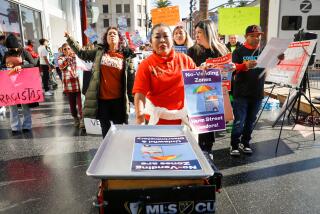L.A. Agrees to Become Owner of Olvera St.
- Share via
The city Monday agreed to take over ownership of Olvera Street and some surrounding area where the tiny pueblo of Los Angeles was founded by Spanish settlers more than 200 years ago, paving the way for a city-sponsored revitalization project for the popular, but aging tourist spot.
The 5-0 vote by the city Recreation and Park Commission ended an unwieldy 1974 joint-powers agreement under which the land--formally known as El Pueblo de Los Angeles State Historic Park--was governed by the state, Los Angeles County and the city.
“The city’s birthplace is finally coming home where it belongs,” City Councilman Richard Alatorre said in urging commission approval.
Alatorre said the move was an “important first step” in sprucing up the street. He noted that few funds were available to upgrade the area under the old tripartite agreement.
The 14th District councilman said Olvera Street, a collection of Mexican-theme curio shops and restaurants founded in 1929 just north of the Civic Center, needed a multimillion-dollar face-lift.
“The merchants sell their wares amid dilapidated buildings and loose brick walkways,” he said. “Many of the historic structures need seismic reinforcing and the market stands need repairs.”
Adequate parking also is needed, he said.
The councilman said he supported an open-bidding process to select a responsible developer for a $25-million project for Olvera Street, adding that the Recreation and Parks Department initially will oversee the project.
But most Olvera Street merchants, many descendants of the street’s founders, said they were not impressed by Alatorre’s remarks.
Although they did not oppose the city’s acceptance of the property, representatives of the Olvera Street Merchants Assn. said they wanted another city entity, such as the Cultural Affairs Department, to oversee the property.
They said they were fearful that political allies of Alatorre--particularly the East Los Angeles Community Union (TELACU)--might be given an unfair advantage to become the developer because the commission could bow to political pressure.
Restaurateur Vivien Bonzo, president of the association, said she feared a “severe bias” by Recreation and Park officials that could eventually hinder attempts to preserve the Mexican traditions and roots of Olvera Street.
“We just want to make sure we aren’t swallowed up by someone like TELACU,” one merchant said.
TELACU has developed an industrial park and other properties, but its trouble with federal authorities several years ago--it was ordered to repay $1 million by a judge because of alleged misuse of federal monies--has made some Latinos distrustful of the agency’s intentions.
The merchants group has been at odds with the park’s management for some time, charging that their concerns received scant attention by park officials.
Moments after the commission’s action Monday to accept the land, the dispute surfaced again as the merchants group said it opposed an $80,000 city allocation to establish a Chinese-American History Museum near Olvera Street.
Bonzo argued that the money could be better spent to help pay for needed structural upgrading or increased security in the area and criticized El Pueblo park manager Jerry Smart for supporting the proposal with no input from her group.
Commission members, however, approved the request to the delight of several Asian historical groups.
More to Read
Sign up for Essential California
The most important California stories and recommendations in your inbox every morning.
You may occasionally receive promotional content from the Los Angeles Times.












